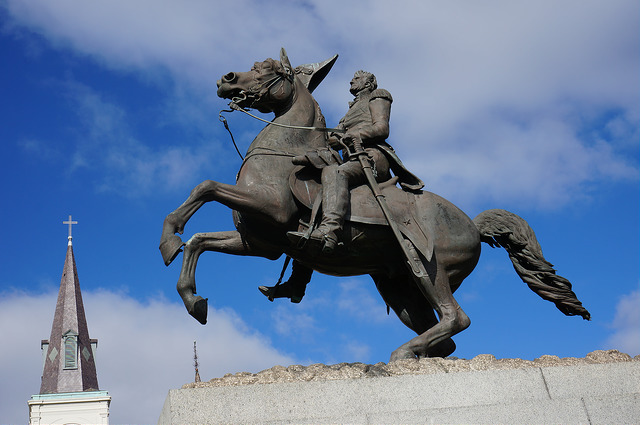Trump and the traditions of American foreign policy (part 1)
Posted By Michael Clarke and Anthony Ricketts on June 17, 2016 @ 12:30

In the wake of presumptive Republican presidential nominee Donald Trump’s address to the Center for the National Interest in Washington DC on 27 April, there has been much conflicting punditry either decrying or justifying the foreign policy program sketched by ‘The Donald’.
Paul Pillar dismissed it as a ‘bumper sticker speech’ [1]. The foreign policy enunciated, Pillar argued, was not only ‘so general and vague as to be platitudinous’ but also laced with ‘blatant contradictions and inconsistencies’ such as Trump’s description of American Cold War foreign policy as ‘a golden age’ simultaneous with the dismissal of American ‘participation in the type of international institutions that were a major and even indispensable part of US policy during those years’.
Trump’s assertion that under his leadership the US would be ‘getting out of the nation-building business to focus on creating stability in the world’, led Daniel Larison of the The American Conservative to note [2] that while ‘Many Americans will cheer the first part of this statement…the second part potentially commits the US to a very ambitious and activist role in the world’.
Such sentiments of restraint and a narrower definition of American national interests have led still others to find policy coherence where arguably none exists. Crispin Rovere, for example, on the basis of Trump’s 27 March interview [3] with David Sanger and Maggie Haberman in the New York Times and his 27 July foreign policy speech, has claimed that Trump is a ‘Nixon-Kissinger realist’ [4].
What has been missing from most of those reactions is an appreciation of the core well-springs of Trump’s musings on foreign policy: the Jacksonian tradition of American foreign policy detailed by Walter Russell Mead [5].
Robert J. Merry has come closest in that respect when he noted [6] that the coming Trump–Clinton presidential contest is shaping as contest (among other things) between whether ‘nationalism’ or ‘globalism’ will guide American foreign policy. Trump’s ‘America First’ sloganeering places Trump in opposition not only to the group of neoconservatives that have had a stranglehold on GOP foreign policy debates in recent times but also to the broader post-Cold War consensus amongst Washington’s foreign policy establishment that US national security is best served by the US remaining the ‘indispensable nation’, in former Secretary of State Madeleine Albright’s oft quoted phrase, that brings both order and justice to the international system.
Merry argues that the strain of nationalism that Trump has tapped is driven by a number of foreign policy-relevant core sentiments. Trumpian nationalists, he argues [6]: ‘don’t care about dominating world events’ but ‘want their country to be powerful, with plenty of military reach…to protect American national interests’; they ask ‘whether the national interest justifies the expenditure of American blood and treasure’ when interventions abroad are proposed; and the ‘fate of America’ is their primary consideration.
Mead argued [5] that American foreign policy since the founding of the Republic has been defined by the evolution of four contrasting yet complementary traditions of foreign policy: the Hamiltonian (promotion of an ‘Open Door’ world), Jeffersonian (maintenance of a democratic system), Jacksonian (populist values, military strength), and Wilsonian (moral principle). A fundamental distinction amongst the four traditions is between those that that seek to perfect and protect the virtues of the Republic (Jeffersonian and Jacksonian) and those that seek to remake the world in its image (Hamiltonian and Wilsonian).
That concerns, in Walter McDougall’s memorable terms [7], the historical debate as to whether the United States would be a ‘promised land’ or ‘crusader state’. The history of American foreign policy since 1945 demonstrates that it has been the extroverted ‘crusader state’ Hamiltonian and Wilsonian traditions which have prevailed. However, the nascent nationalist–globalist divide depicted by Merry points to the recrudescence of the Jacksonian tradition.
That tradition is defined by a number of core characteristics that clearly resonate with Trump’s rise as the GOP’s standard bearer.
The Jacksonian tradition [8]—named after the Republic’s 7th (and in his time, just as controversial as Trump) President Andrew Jackson—is based on what Mead terms a ‘community of political feeling’ defined by principles of populism, individualism, honour and courage.
Drawing on the work of David Hackett Fischer, Mead identifies the basis of the populism [9] central to the Jacksonian tradition with the protestant ‘Scotch-Irish’ element of British colonisation of North America. The ‘Scotch-Irish’, Mead argues [5], shaped by centuries of conflict in Ireland, ‘established a culture and outlook formed by centuries of bitter warfare before they came to the United States’.
That tradition, according to Rogers M. Smith [10], established by the mid-19th century something akin to an ‘American creed’ whereby many Americans ‘identified membership in their political community not with freedom for personal liberal callings or republican self-governance…but with a whole array of particular cultural origins and customs’ strongly linked to North European ancestry, Protestantism, belief in the superiority of the ‘white race’, and patriarchal familial leadership.
In order to understand the importance of the Jacksonian tradition’s influence on American foreign policy one must recognise its central engine: Jacksonians [8] ‘believe that government should do everything in its power to promote the well-being—political, economic, and moral—of the folk community. Any means are permissible in the services of this end, as long as they do not violate the moral feelings or infringe on the freedoms that Jacksonians believe are essential’.
It is that engine—as we shall discuss in part two—that has been driving Trump’s emergent foreign policy narrative.
Article printed from The Strategist: https://www.aspistrategist.org.au
URL to article: https://www.aspistrategist.org.au/trump-traditions-american-foreign-policy-part-one/
URLs in this post:
[1] ‘bumper sticker speech’: http://nationalinterest.org/blog/paul-pillar/trumps-bumper-sticker-speech-15970
[2] to note: http://www.theamericanconservative.com/larison/trumps-foreign-policy-speech/
[3] Trump’s 27 March interview: http://www.nytimes.com/2016/03/27/us/politics/donald-trump-transcript.html?_r=1
[4] ‘Nixon-Kissinger realist’: http://www.lowyinterpreter.org/post/2016/04/07/Trump-a-Nixon-Kissinger-realist-Part-1.aspx
[5] detailed by Walter Russell Mead: https://www.amazon.com/Special-Providence-American-Foreign-Changed/dp/0415935369?ie=UTF8&*Version*=1&*entries*=0
[6] when he noted: http://nationalinterest.org/feature/trump-vs-hillary-nationalism-vs-globalism-2016-16041
[7] Walter McDougall’s memorable terms: https://www.amazon.com/Promised-Land-Crusader-State-Encounter/dp/0395901324?ie=UTF8&*Version*=1&*entries*=0
[8] The Jacksonian tradition: http://www.jstor.org/stable/42897216?seq=1#page_scan_tab_contents
[9] Mead identifies the basis of the populism: https://global.oup.com/academic/product/albions-seed-9780195069051?lang=en&cc=au
[10] according to Rogers M. Smith: http://www.jstor.org/stable/pdf/448536.pdf
Click here to print.